case studies
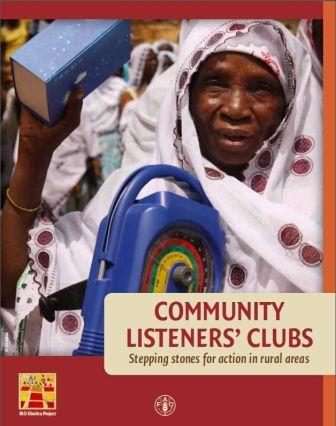 [2011] This publication summarizes the unique experience of the community listeners’ clubs set up in Niger and the Democratic Republic of Congo by FAO-Dimitra, a participatory information and communication project which contributes to improving the visibility of rural populations, women in particular.
[2011] This publication summarizes the unique experience of the community listeners’ clubs set up in Niger and the Democratic Republic of Congo by FAO-Dimitra, a participatory information and communication project which contributes to improving the visibility of rural populations, women in particular.The first chapter offers a brief overview of the community listeners’ clubs, their goals and internal functioning and the results achieved. The second chapter tells the story of the listeners’ clubs in the words of the stakeholders, explaining how they were established in the two countries. The third chapter sets out more practical guidelines on the stages involved in creating community listeners’ clubs.
The document is also available in French.
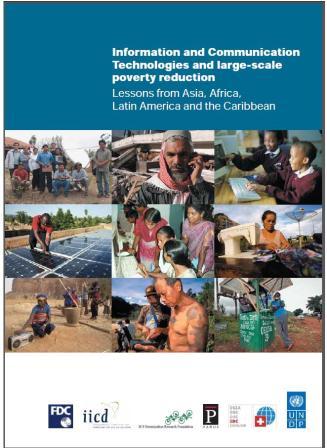 [2005] Hundreds of initiatives, projects and programmes around the globe are using ICT to help the up-scaling of poverty reduction efforts. But changes in technology and approaches happen extremely rapidly and it is difficult to condense common lessons.
[2005] Hundreds of initiatives, projects and programmes around the globe are using ICT to help the up-scaling of poverty reduction efforts. But changes in technology and approaches happen extremely rapidly and it is difficult to condense common lessons.
This publication edited by the Swiss Development Cooperation and PANOS compiles state-of-the-art lessons on the topic of ICTs for poverty reduction, in different regions of the world. These discussion papers and lessons have been derived from various events and processes connected to the World Summit on the Information Society (WSIS) of Tunis, November 16–18, 2005.
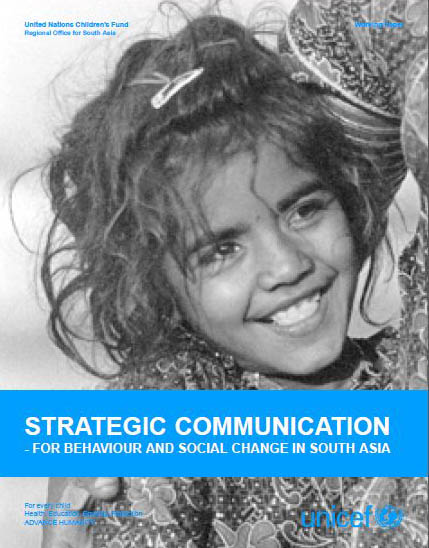
[2005] South Asia has a long tradition of using communication to promote development goals. Communication approaches have been variously used for promoting immunization, prevention of diarrhoeal dehydration and HIV/AIDS, female literacy, among others. These have been in the form of mass media campaigns, radio programs, posters, street plays and localized outreach through communities and NGOs.
This working paper presents a synthesis of experiences in applying various communication approaches ranging from mass communication and entertainment education, interpersonal communication, participatory development communication, advocacy and social mobilization that have been used in South Asia and elsewhere.
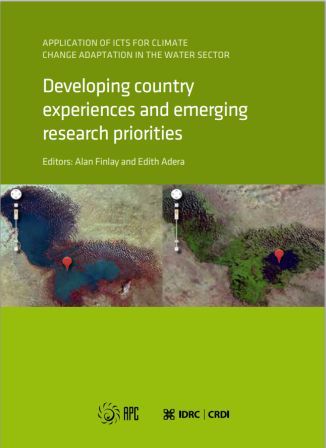 [2012] Adaptation to contexts of water stress is often a mix of climate-consequential responses and responses to social, economic, political and cultural fluxes. Information and communications technologies (ICTs) have proven useful in tailoring responses to situations arising out of the climate-water nexus in the developing world. ICTs are increasingly being adopted as key tools for data collection, decision support and improved communication networks.
[2012] Adaptation to contexts of water stress is often a mix of climate-consequential responses and responses to social, economic, political and cultural fluxes. Information and communications technologies (ICTs) have proven useful in tailoring responses to situations arising out of the climate-water nexus in the developing world. ICTs are increasingly being adopted as key tools for data collection, decision support and improved communication networks.This publication brought out by the International Development Research Centre (IDRC) and the Association for Progressive Communications (APC) discusses current trends, conceptual models and the need for an integrated research agenda in the domain of ICTs, climate change and water, with special reference to regions of high biophysical vulnerabilities to climate change and variability.
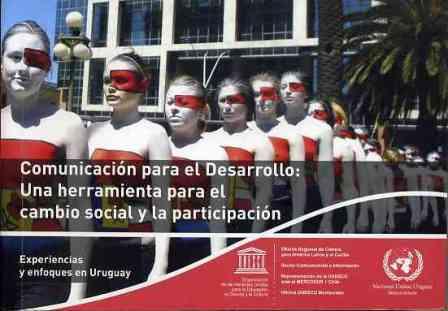 [2010] Este libro presenta tanto el potencial como la variedad de experiencias de comunicación en los procesos de desarrollo, cambio social y participación. Los ejemplos demuestran claramente cómo la comunicación para el desarrollo (CpD) fortalece la sustentabilidad de proyectos, con un enfoque particular en actores y experiencias de Uruguay.
[2010] Este libro presenta tanto el potencial como la variedad de experiencias de comunicación en los procesos de desarrollo, cambio social y participación. Los ejemplos demuestran claramente cómo la comunicación para el desarrollo (CpD) fortalece la sustentabilidad de proyectos, con un enfoque particular en actores y experiencias de Uruguay.Con este libro los autores e instituciones participantes contribyen al diálogo con los medios, la academia y la sociedad civil a fin de aprovechar aún mejor el potencial de la comunicacion para realizar cambios sociales.
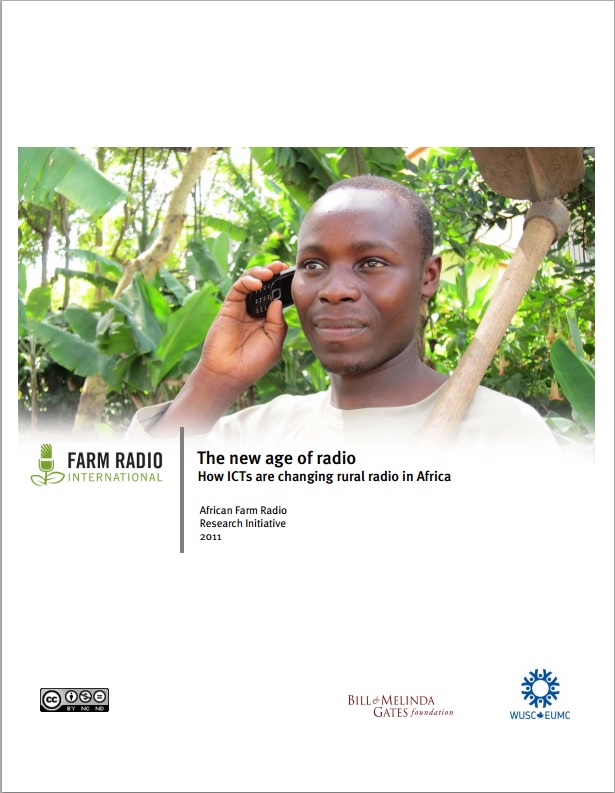 [2011] Despite rapid gains in information and communications technology (ICT) worldwide, radio stations in Africa have largely not had access to integrated mobile phone technology, desktop editing, portable recording, computers, or access to the internet.
[2011] Despite rapid gains in information and communications technology (ICT) worldwide, radio stations in Africa have largely not had access to integrated mobile phone technology, desktop editing, portable recording, computers, or access to the internet.As part of a 42-month action research program called The African Farm Radio Research Initiative (AFRRI), Farm Radio International (FRI) partnered with 25 radio stations in five African countries to implement a series of ICT packages designed to enhance farm radio programming. In partnership with World University Service of Canada (WUSC) and funding from the Bill & Melinda Gates Foundation, AFRRI’s aim was to discover, document, and disseminate best practices for using radio-based communications to enhance food security in Africa.
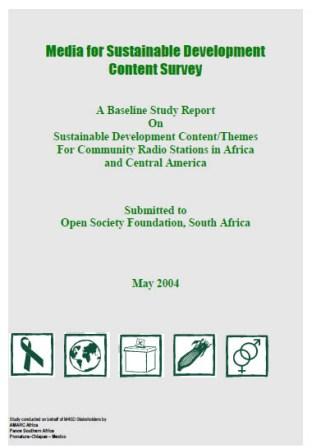 [2004] Community radio is based on the principles of community development and community participation. Therefore the main commitment and mandate for community radio stations is to actively involve community members and ensure programming on themes that will contribute to the development of the communities they serve.
[2004] Community radio is based on the principles of community development and community participation. Therefore the main commitment and mandate for community radio stations is to actively involve community members and ensure programming on themes that will contribute to the development of the communities they serve.This report, published by AMARC and Panos, is an account of data/information collected from community radio stations in Africa to assess their experiences with programming of content related with sustainable development topics such as HIV/AIDS, Gender, Environment, Human Rights and Electoral Systems and Democracy.
 [2001] This is a collection of stories where participatory communication has led to social change, ranging from bush radios to street theatre and local telecentres. The book forms part of the Rockefeller Foundation’s Communication for Social Change initiative.
[2001] This is a collection of stories where participatory communication has led to social change, ranging from bush radios to street theatre and local telecentres. The book forms part of the Rockefeller Foundation’s Communication for Social Change initiative.The 50 case studies show how people living in poor communities across the world can potentially seize control of their own life stories and begin to change their marginal and unjust circumstances. The rationale for participatory communication in the international development field is explained by the link between communication and empowerment, as power relations are inherent in local community decision-making processes and in communal action. The book suggests that community-based radio is perhaps the communication method par excellence when trying to reach excluded or marginalized communities. The case studies also include examples of the continued success of traditional communication methods such as drama, dance, music, puppets, drums, storytelling and dialogue circles, where person-to-person communication is crucial.
The document is also available in Spanish and French
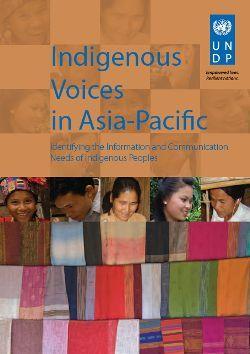 [2012] This report presents the highlights of five country assessments undertaken between 2009-2011 to identify the communication and information needs of indigenous peoples in Asia-Pacific. The assessments used a participatory and inclusive approach to analyze major development issues faced by indigenous peoples.
[2012] This report presents the highlights of five country assessments undertaken between 2009-2011 to identify the communication and information needs of indigenous peoples in Asia-Pacific. The assessments used a participatory and inclusive approach to analyze major development issues faced by indigenous peoples.They considered media and communication landscapes - encompassing freedom of expression and information, the safety of journalists, and community media, particularly radio - and how different factors facilitate or hinder information and communication for indigenous peoples, including the potential of new modes of digital communication and information and communication technology (ICT). The assessments provide a basis for recommendations on priority interventions for each participating country and for a regional strategy.
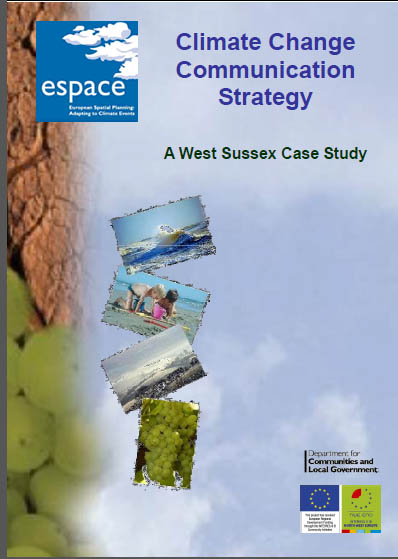 The purpose of this document is to develop a more systematic and effective approach to communicating climate change in West Sussex.
The purpose of this document is to develop a more systematic and effective approach to communicating climate change in West Sussex.The document draws on the experiences and lessons learned through climate change awareness raising projects in West Sussex, particularly those undertaken as part of the EU funded ESPACE (European Spatial Planning: Adapting to Climate Events) project, as well as DEFRA’s (Department for Environment, Food and Rural Affairs) National Climate Change Communications Strategy.




